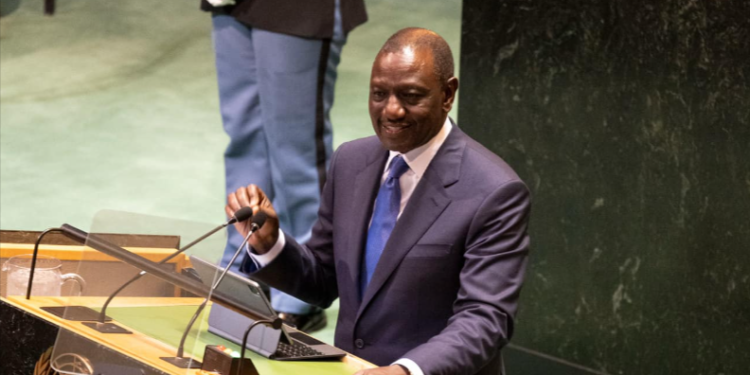President William Ruto has issued a sharp rebuke of the current structure of the United Nations Security Council (UNSC), calling it outdated, undemocratic, and incapable of addressing modern global crises. Speaking at the United Nations General Assembly (UNGA) in New York, Ruto urged world leaders to reform the institution to better represent Africa and other underrepresented regions, as conflicts and geopolitical rivalries intensify across the globe.
During his address to the General Assembly, Ruto took direct aim at the Security Council’s composition and its decision-making process, which grants veto power to just five permanent members— the US, UK, France, Russia, and China. He criticized the current structure as being “dysfunctional” and out of step with the needs of a rapidly changing global landscape. “An institution that excludes 54 African countries with 1.4 billion people while allowing one nation to veto decisions of the remaining 193 member states in the 21st century is simply unacceptable,” Ruto stated.
This comes at a time when several African and Global South nations are pushing for greater representation in global governance bodies, reflecting growing dissatisfaction with institutions that many believe are dominated by historical powers and no longer serve the broader international community.
Ruto argued that the UNSC’s failure to effectively manage crises from Ukraine to Yemen highlights the necessity for change. “The world’s most powerful states have increasingly chosen unilateralism and militarization over dialogue and diplomacy,” he said, adding that the council has proven to be “non-inclusive, unaccountable, and at best opaque.” His remarks align with longstanding African Union calls for permanent representation on the council.
In a speech heavy on global security concerns, Ruto painted a bleak picture of international relations, warning that the world was facing a precarious security situation with growing tensions and conflict zones stretching across multiple regions. He highlighted conflicts in Gaza, Sudan, and the Eastern Democratic Republic of Congo, emphasizing that these have often become “battlegrounds for armed factions, external interventions, and proxy wars,” leaving a trail of destruction in their wake.
Ruto described the global geopolitical landscape as increasingly polarized, with rivalries between major powers driving regional instability and “inducing geopolitical and geo-economic realignments.” He urged world leaders to abandon the rhetoric of division and focus on solutions that promote collective peace and security, stating, “The world cannot realize durable peace, security, and shared prosperity when emphasis is being put on what divides rather than what brings us together.”
Turning to Kenya’s role on the international stage, Ruto reaffirmed his country’s commitment to peace and security, particularly in the African region. He highlighted Kenya’s ongoing peacekeeping efforts in Somalia and the broader Horn of Africa, while noting its involvement in the UN-mandated multinational security support mission to Haiti.
Kenya recently deployed 382 specially trained police officers to Haiti, at the request of the Haitian government, to help combat gang violence. Ruto praised the progress being made on the ground, stating that the mission had “advanced the pacification of cities and towns” and relieved many communities from criminal gang control. He called for additional international support, emphasizing that the mission has the potential to transform what many had dismissed as “Mission Impossible” into a success. However, he acknowledged that financial and logistical constraints remained significant challenges for the operation.
Addressing the twin challenges of climate change and economic inequality, Ruto warned that the current global financial architecture exacerbates disparities between wealthy and developing nations. He argued that biased methodologies used by international credit rating agencies put African countries at a disadvantage in accessing affordable financing. This, he said, makes it harder for countries in the Global South to address basic needs, such as healthcare and education, while managing debt obligations.
“Many countries in the Global South are forced to choose between buying medicine and paying their debt obligations,” Ruto said. “This is not an abstract illustration detached from daily reality but the normal experience of millions of ordinary people.”
In response to these challenges, Ruto called for urgent reform of the international financial system, including debt relief and concessional financing. He pointed to Kenya’s leadership in green industrialization initiatives, particularly in unlocking Africa’s clean energy potential, as critical to addressing both the economic and environmental crises.


















